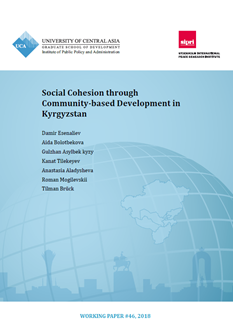Social Cohesion through Community-based Development in Kyrgyzstan
Community-driven development (CDD) – a widely practiced tool by development donors and practitioners worldwide - strives to empower and develop communities by giving them joint control over aid allocations. This is expected to improve local development, local governance, and strengthen social cohesion. However, the empirical evidence for the third outcome is quite weak. This paper presents the findings of an impact evaluation research examining the extent the community driven development intervention implemented during 2014-2017 strengthened social cohesion in two regions in Kyrgyzstan. Our findings are that, on the one hand, the CDD project led to a sense of unity and cooperation and to a perception of improvements in local governance and educational services. On the other hand, the program had at best a weak effect on deep-trenched perceptions, attitudes and trust for closely related social groups and local institutions. We posit that these results obtained in part because the duration of the CDD interventions was rather short and the micro-projects were only realized in less than a half of villages in treatment sub-districts. It stands to reason that larger and longer CDD projects would have had larger impacts on social cohesion as well.








